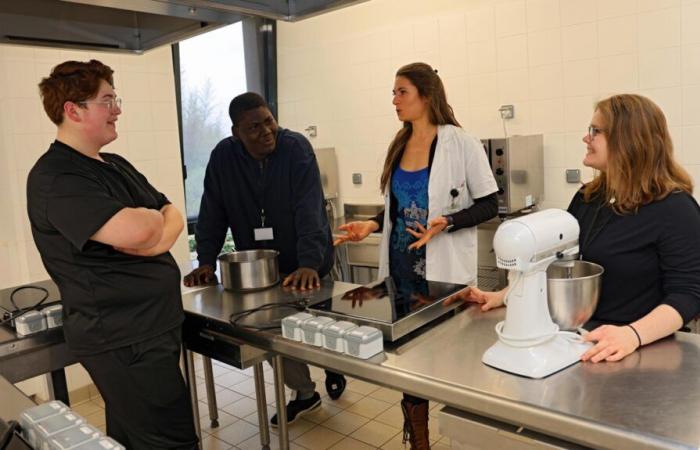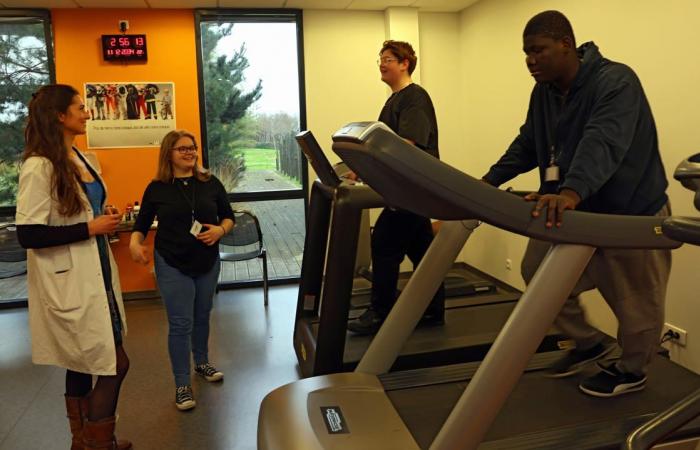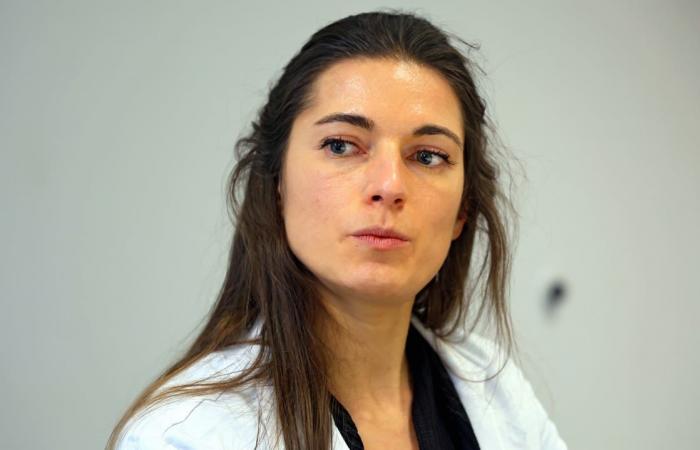Eric, 17 years old, large jogging pants, hooded sweatshirt, gets on the treadmill at the gym.
Four times a week, he and the other patients, aged 11 to 18, attend sports sessions at the Théraé clinic, opened in La Chaussée-Saint-Victor in 2012 and specializing in the treatment of Obesity, defined by the World Health Organization (WHO) as being associated with a body mass index (BMI) greater than or equal to 30.
He can count on the support of his comrades hosted in this separate wing of the medical center. Here, sixteen middle and high school students live from September to June. If they attend school in Blois, they eat every meal at the clinic, including midday. Then they sleep there, like at boarding school.
Even in the effort, Eric keeps smiling: “I was already doing sports before arriving here, I love it! »
Meeting with three young patients, Cheyenne, Louka and Éric (from right to left).
© Photo NR, Jérôme Dutac
On the next carpet, Sheyenne (18 years old): “I didn’t do much sport before arriving here”recognizes the young woman bluntly. So it’s difficult for her to maintain the pace on weekends or during vacations when she returns to her parents’ house: “At the center, I give my all. Outside, I joined the gym where I alternate between cycling and walking. »
Personalized care for young people
“They don’t find sport enjoyable at first. Then, little by little, they find pleasure in the effort. Sporting activity is also a way of reconnecting with your body”explains Marine Bosek, one of the dietitians-nutritionists.
Young people have four sports sessions per week.
© Photo NR, Jérôme Dutac
The public, adolescents, benefit from the support of a doctor, nutritionists-dieticians, psychologists, specialized educators or even physiotherapists.
“An initial discussion with young people allows us to know where the difficulties encountered come from, whether social, psychological, or environmental”continues Marine Bosek. Teenagers suffer “eating disorders or obesity”. The objective? Establish “personalized care for young people”.
Keep good reflexes
In the center, adolescents learn or relearn how to eat, during dietary workshops where they expand their knowledge on “dietary balance, discover satiety and develop a personal relationship with food by learning to eat mindfully”develops Marine Bosek. “The goal is not to frustrate them or put them on a diet. It’s more of a re-education” food… To allow adolescents to gradually regain self-confidence.

Meeting with a dietitian, Marine Bosek.
© Photo NR, Jérôme Dutac
A rehabilitation that involves “games, escape games with puzzles, dietary questions that lead patients to think about the balance of meals”.
Here again, the difficulty is to keep the right reflexes once outside the medical center: “We received a lot of advice, I feel ready to go out”Sheyenne slices. Louka: “Théraé helped me a lot, I had a lot of trouble managing portions. » Eric is still doubtful: “ I still have trouble measuring the quantities. »
“Several factors” are involved in weight gain. Besides the “sedentary lifestyle”Marine Bosek evokes “the financial aspect” and the “ difficulty » for young people to buy “good quality products, an important obstacle to access to a balanced diet”.
As the days go by, cohesion is created between the young people, who have made these walls their own. They help each other. “Théraé is my second home”says Louka.
Obesity on the rise
> From 6% to 14%, the obesity rate among women more than doubled between 1996 and 2017.
> Among men, the increase is comparable, going from 7% to 14% in 2016, before a slight drop to 13% in 2017, according to a Public Health France study published in September 2024.








